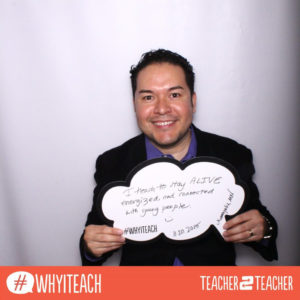This blog post is written by R. Joseph Rodríguez, former Chair, NCTE College Section, and current member of the NCTE Achievement Awards in Writing Advisory Committee.

“Every writer’s challenge is returning to the page,” explains Pat Mora in her essay titled “A Latina in Kentucky” (298). This rings true for many of my students and for me in my work as a teacher educator and researcher.
In the form of a preamble, I offer the following:
The act of writing is a deliberate act by the writer. I believe the act of writing confirms what is possible through our imagination, language, and meaning.
To write requires energy and persistence as well as some resilience from the writer in the labor to write.
For many children and adolescents in school classrooms across the country, the act of writing is a great feat. Nonetheless, it begins in small installments and junctures to surprise the self while writing.
The writer questions the self and others through the tempest of ideas and words that arrive—and before they depart—in the making of meaning.
Writing is practiced in calmness and through calamity.
The writer must persist and keep going through delirium, doubt, intuition, speculation, and wonder.
Coming to writing can be like a scholarly invitation or even a writerly initiation with support and encouragement by a teacher, peer, or parent.
The invitation or initiation is influenced by wonder as one engages or disrupts language to write.
The “keeping going” is essential in the labor of writing and telling, as Seamus Heaney shows us to be true in the making of poems and the making of our very own lives.
Overall, the environment to write must be invitational and may require a kind of revival based on past experiences, which were either affirming about working with language or possibly unwelcoming to the writing process.
#
Even today, some students may be unaware of their writing habits and histories as they look into a white page of blank space, glow before a lit monitor screen, or scroll through an electronic device before them.
How do ancient actions in literate societies influence today’s definition of literacies and writing?
Research reveals various models and rites that reflect the enactment of literacy in our schooling, personal, and professional lives (NCTE).

In the book Enacting Adolescent Literacies across Communities: Latino/a Scribes and Their Rites, I describe the act of writing as being as ancient as the scribes whose labors we witness across the civilizations, cultures, and societies we still study today.
Through case study and ethnography research, I provide portraits and vignettes from classrooms with teachers and students practicing various literacies for making meaning, questioning decisions and situations, understanding texts and ideas, interacting with others, and advancing social responsibility.
In an age of rote learning and assessments, which can overlook deeper thinking and learning and new knowledge in students’ lives, ancient histories and humane research reveal how interconnected and interrelated we are as thinkers and learners.
As a researcher in various secondary and postsecondary settings, I witnessed adolescent students engaging in literacies and communities that “build trust through writing absent of standardized testing and machine-based scoring” in the presence of caring teachers and librarians (Rodríguez xxix).
Adolescents’ rites and approaches to using language and making writing happen drew me into their lives and habits. In conversation and deliberation with their teachers, I observed young people adopt social and civic responsibilities as emerging writers and active citizens.
Overall, young writers sought listeners and readers by enacting literacies for conversation, understanding, and change in their everyday life and in a global society.
Jeff Anderson observes, “Writing is a transaction between readers and writers. As writers of text—as humans—we desperately want to be heard, to receive a response, or to connect” (xii). The transaction Anderson describes reminds me of the research by Louise Rosenblatt on the teaching of literature and the recent young adult literature books written by Matt de la Peña.
Specifically, de la Peña acknowledges, “[I]f you’re a diverse reader, it’s incredibly empowering to see yourself as the hero in a book. Nothing can replace the unspoken validation kid[s] feel when they see themselves on the page. It confirms existence” (Long).
Ultimately, language arts is born on the page or canvas, across the stage, on the screen, and also through other media as humans make meaning and communicate with themselves and others. And, as Mora notes, we return to the page—albeit a daily challenge—for civic engagement and social connections and responsibilities.
Works Cited
Anderson, Jeff. 10 Things Every Writer Needs to Know. Stenhouse Publishers, 2014.
Heaney, Seamus. The Spirit Level. Faber & Faber, 1996.
Long, Cindy. “Author Matt de la Peña: Diverse Books Empower Students.” NEA Today, 15 Aug. 2016.
Mora, Pat. “A Latina in Kentucky.” The Horn Book Magazine, vol. 70, no. 3, May 1994, pp. 298-300.
National Council of Teachers of English (NCTE). NCTE Guideline: Professional Knowledge for the Teaching of Writing, Feb. 2016. Accessed 15 Dec. 2016.
Rodríguez, R. Joseph. Enacting Adolescent Literacies across Communities: Latino/a Scribes and Their Rites. Lexington Books, The Rowman & Littlefield Publishing Group, Inc., 2017.
Rosenblatt, Louise. Making Meaning with Texts: Selected Essays. Heinemann, 2005.
Joseph Rodríguez is assistant professor of literacy and English education at The University of Texas at El Paso, located in the Chihuahuan Desert borderlands and across from Ciudad Juárez, Chihuahua, México. His research interests include academic writing, children’s and young adult literatures, and socially responsible biliteracies. Catch him virtually @escribescribe or via email: rjrodriguez6@utep.edu.
